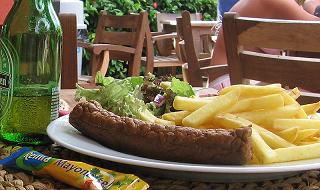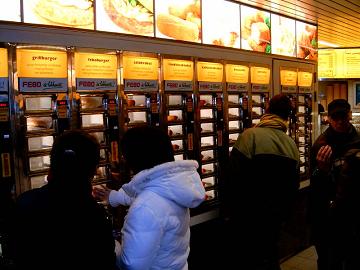
I’d better warn you, I’m in a very, very bad mood this morning; it’s a bloody good job I don’t have access to weapons.
I had hoped that after the fiasco that was yesterday this morning would be better. Yesterday was awful; first the hospital car didn’t turn up at all for my cardiologyappointment/dialysis session and I had to make my own way via bus, ferry and tram across town from North to South Amsterdam and the hospital. Despite Amsterdam’s excellent public transport it’s still an hour’s tiring slog away.
I was particularly anxious to get there on time, because the cardiology tests are the only results I’m waiting for to get the go-ahead from the surgeon and a tentative date for a kidney transplant at the end of the summer. Not crucially important or anything, oh no. I was already late for an appointment I’d already had to rearrange three times over the past three months because of taxi non-appearance or ridiculous lateness.
I ‘d been so worried about the taxi company’s (ZCN Vervoerscentrale Rotterdam since you ask) previous unreliability I actually called them 30 minutes before the cab was due to check that transport was in fact arranged. Although I’d got the nurses to book it, I didn’t trust the taxi people one bit based on their dire past performance. I was right not to.
The dispatcher said yes, it’s all booked for 12.30 to be at the hospital by 1.20, geen probleme, the taxi’s on it’s way. Except it wasn’t.
12.30 came and went… then 12.40… then 12 .45… I’m getting panicky, it’s 45 minutes across town through mad afternoon traffic. Where the hell is this taxi? They’re cutting it more than a bit fine… I rang the dispatcher again to see what was happening. After waiting another 5 minutes through the ridiculous automated phone menu I’m told ‘What taxi? It’s not on my list. I know nothing.’
But I checked with you 45 minutes ago! You said it was booked! You lied! ‘It’s not on my list. I know nothing. Bye!’
I thought I had become accustomed and had learned to deal philosophically with crappy Dutch employees who can’t do their jobs competently, who can never be fired and know it, and who have no inkling or even the faintest glimmer of understanding even the concept of customer service. I’ve grown used to the ‘Customers? Who they? We run this company for us employees’ state of mind that’s so prevalent in Dutch business and public services. But flat-out, blatant lies have thankfully been relatively rare so far.
The reason I get so steamed is that the taxi service’s constant unreliability adds around 2 hours unnecessary transport time to each end of an already onerous 4 hour dialysis session three times a week. That doesn’t do a lot for my equanimity. It also means I can’t do anything at all on a dialysis day, even though it’s only a half day, because I can’t plan for their unreliability. It’s not as though it’s free, either.
I’d had more than enough of bloody, ass-covering Dutch employees at this point. You’re lying to me now? I don’t think so. I rang back and gave the dispatcher a full-bore blast of the concentrated bile that’s been building up in my roiling gut for months, as I’ve stood fuming in the rain outside the hospital, waiting hopelessly over and over again for my missing taxi home.
It felt good. But it didn’t get me my taxi.
I got there, in the end, but very tired and very late. By the time I got out of cardiology (the usual dull, unsmiling, mechanical Dutch experience these things usually are) it was dialysis time. I’d had nothing to eat all day and no time for even a coffee beforehand. Pissed off, knackered, hungry and with only a pack of fruit pastilles for sustenance, I felt the session would never end.
It wasn’t helped by the fact I’d been assigned the most annoying nurse, the one who thinks it’s her life’s work to to teach the foreigner Dutch even though I’ve asked her not to, and who refuses to communicate in English even though she’s perfectly able. It wasn’t helped either by the unnamed idiot who kept ringing my mobile, across the room in my jacket pocket, which I couldn’t reach because of being tethered to the machine by the big IV line in my jugular.
Argh! Even if I could’ve answered the damned thing it would have been pointless: anyone likely to ring me on my mobile should know by now that there’s no mobile phone coverage in the dialysis department. Who the hell was it calling?
My mood hadn’t improved by the time dialysis finished. When I finally got home, exhausted, pissed off, very hungry and with only a cold ham sandwich on crappy, dry Dutch bread to look forward to for dinner, I found that, as is depressingly usual when interesting bloggable stuff happens, not long after I set off for the hospital yesterday yet another cabinet minister had resigned and I was yet again elsewhere, out of internet and radio range.
Some days you just want to kick something.
I’d hoped that this morning would’ve been better but I got up to hear that racist prick Geert ‘Needs his roots done’ Wilders on the radio, crowing that he’s made big gains in the EU elections and now the housepainters who’re doing the outside of our houses are in and out to get through to the rear without knocking or even so much as a bye-your-leave.
I know I agreed with the foreman yesterday morning that they could come through to get access today, but I had no idea it would mean a constant stream of workmen in painty boots through my living room and kitchen from 7.30 am till lunchtime who’d keep leaving the inside door open, even though I’ve asked them several times to close it in case one of the cats (who’ve never really been in the Big Outside) were to get out and get themselves run over.
It really is a good job I have no weapons to hand. If one of the cats got out or I got any more pissed off, I think I’d go postal.




